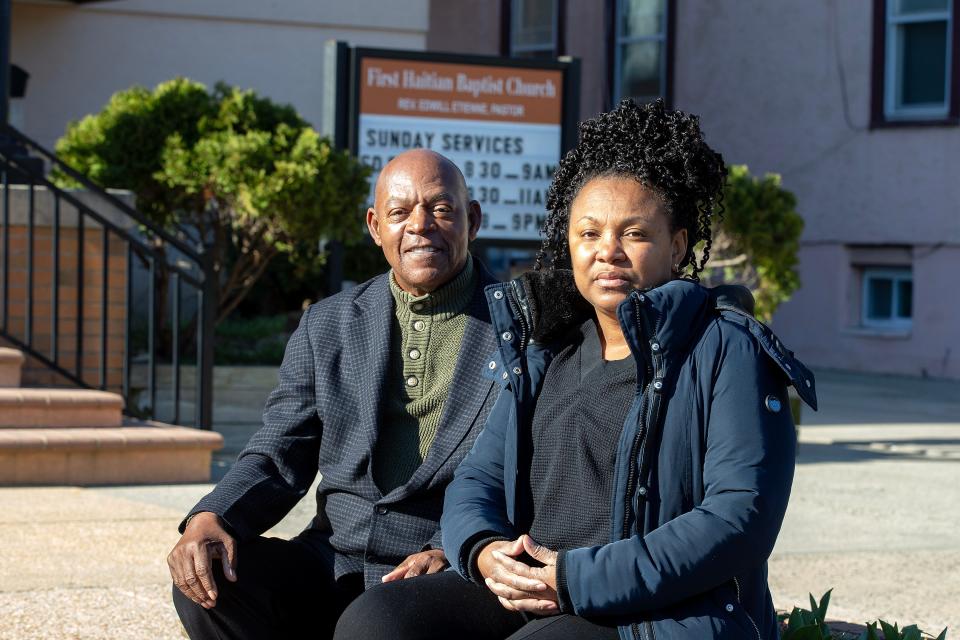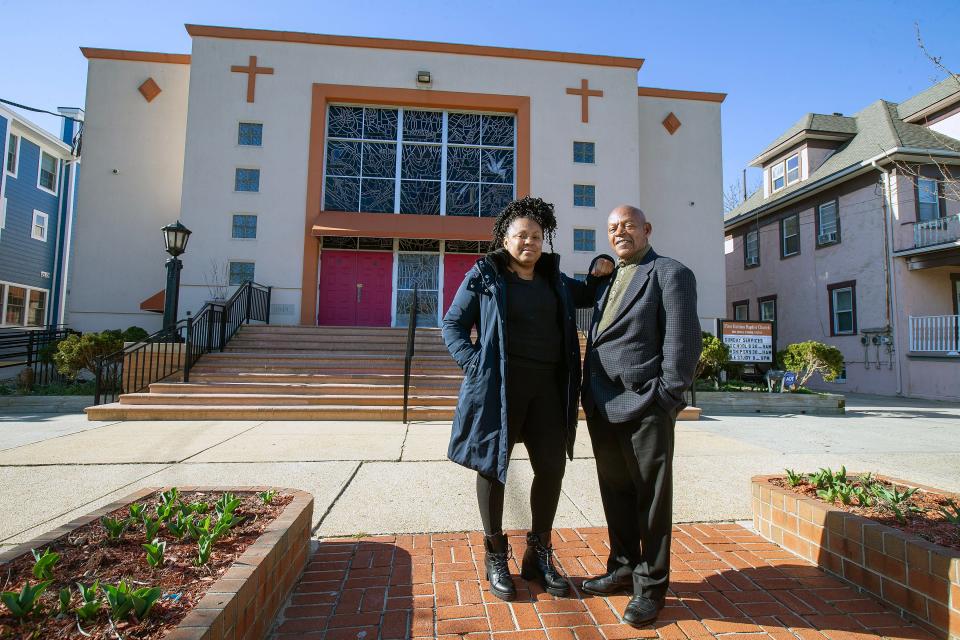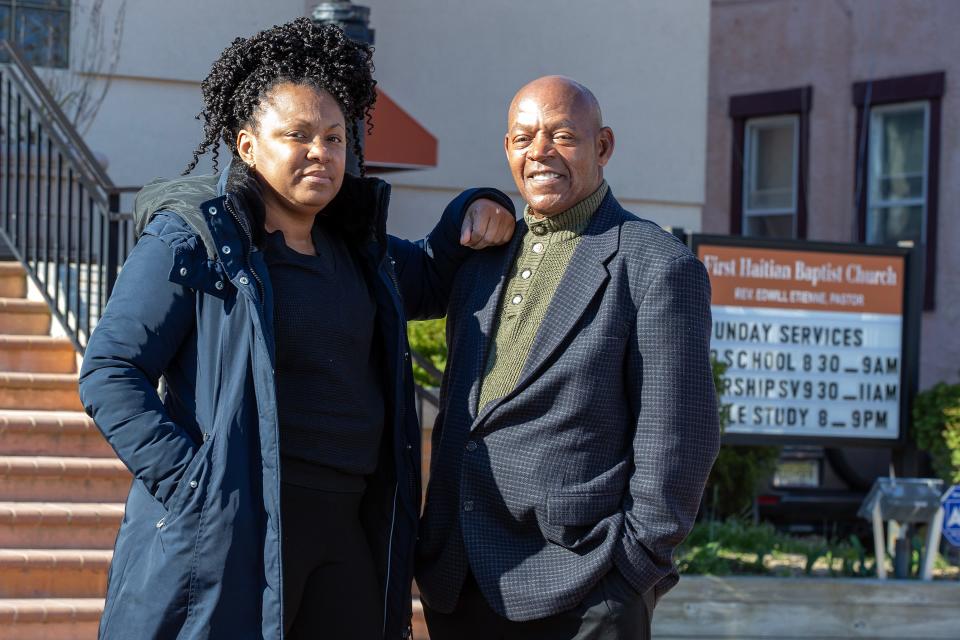'You can't breathe': Haitian Americans at Jersey Shore terrified for families in Haiti
Jean Lizaire was born in Haiti but moved to Asbury Park in 1977 before returning to Haiti in 2011 as a Christian missionary, helping build churches while spreading the gospel. He came back last month to visit family in Monmouth County but finds himself stranded in the United States because instability has made travel almost impossible in Haiti.
Lizaire told the Asbury Park Press that he wants to go back home "so bad, but it is not possible at this time because there is no guarantee that I can get out of the airport (in Haiti) if I do" because "bandits rule the country.
"My nephew is (in Haiti) right now and he says to me all day long it is shooting after shooting on a daily basis. They can pick up 30 to 40 bodies in the streets on a daily basis," he said.
As the ongoing crisis in Haiti causes Americans to evacuate the island, Haitian communities around the United States, such as in Asbury Park, feel helpless as bandits and gangsters vie for control of their cultural home.

"(Haiti) is the same conversation in every household, every church and every club, it is the same conversation. Where do we go from here?" Lizaire said. "I am 69 years old and still shocked by the way people are able to survive in (Haiti), especially the lower class."
Earlier this month, the State Department urged Americans not to travel to Haiti amid the gang violence in the country, after the island nation declared a state of emergency.
'We were lucky to get out': Writer Mitch Albom, 9 others visiting his orphanage rescued from Haiti
"I came in on the 12th of February. I was supposed to be here for about a month and then all of sudden there were no flights, there were no ways back home," Lizaire said.
The widespread violence that took over Haiti’s capital on Feb. 29 brought even more fears of a humanitarian crisis in Haiti.
Haiti has been a Level 4: Do Not Travel destination in State Department travel advisories since before the 2021 assassination of President Jovenel Moïse, followed by high-profile attacks, including an attempt by armed gangs to seize control of the country’s main international airport.
Lizaire's niece Sheila Etienne told the Press that "ever since (Lizaire) has been here his phone has not stopped ringing" as people from the churches he helped set up in Haiti continue to call.
"The people that are in danger (keep calling). As long as you have family (in Haiti), you can't breathe," Etienne said.

Mitch Albom: Our escape from Haiti must highlight those who are still there
Dead bodies outside the door
Etienne is the owner and operator of 2 For Care Early Childhood Learning Center in Asbury Park, and she has previously served as president of the Asbury Park Board of Education after being elected twice to three-year terms. She is also a member of National Haitian American Elected Official Network (NHAEON).
"The last couple of days they have been just setting empty houses on fire," Etienne said. "My cousin is in Haiti, on the ground, he is on the phone. He was outside his house and there was just dead bodies everywhere. He said there was people on motorcycles last night. They just drove up to people and started shooting people in the head. This is my cousin on the phone and he is walking over dead bodies outside of his door."
Haiti's gang crisis: How it came to be and what's happening now
Lizaire said that bandits have been a problem for years, both in the major cities and the surrounding areas. He had a tough time just getting to the capital of Port-au-Prince to fly out of Haiti. Normally he would fly from his home into the city because there is no way to drive there, but that particular day there were no flights.
"For a few years now, you cannot drive from the south side into Port-au-Prince because the bandits are all over the place," Lizaire said. "Normally when you drive from Fond-des-Blancs to Port-au-Prince, it's three to four hours, but that particular time … it took me 12 hours to do that."
Day to day life in Haiti right now is not easy because "everywhere is blocked."

'How can you eat?'
Etienne said it is not just the violence that is terrifying.
"You're talking about a place where all this is going on and you can't even bunker down because you don't have the regular utilities coming to your house. You might have electricity today, you might not have it tomorrow. You definitely don't have a tap where you turn on water in Haiti and you have water delivered," Etienne said.
As of this writing, the exchange rate for one US dollar is $133.33 in Haitian gourdes. Lizaire said "they still can get some groceries, but at a very hefty price."
Haitian Americans reaching out: With Haiti in the grips of gang violence, 'extremely generous' US diaspora lends a hand
"A couple years ago when things were bad already, we were paying (400 gourdes) for a pack of rice. This past December we were spending (1,000 gourdes) for a bag of rice. That same bag of rice is (1,800 gourdes)," Lizaire said.
He added that most people he knows earn maybe $25 to $30 US per month.
"Imagine, how can you eat? This is a question I have been asking myself since I was a child. How did my mother make it?" Lizaire said. "Today I am in the middle of it and I know it is hard on so many parents to be able to feed their kids today. Most of those people go three days before food."
Growing instability
Haiti has been bad since the earthquake in 2010 that killed anywhere from 100,000 to 300,000 people, but it has gotten significantly worse since the presidential assassination three years ago. Leaving is not an option for many.
"You can't get a passport because there are no government agencies running," she said. "Imagine you walk out of your house tomorrow and there's no police, no nothing," Etienne said.
She added that much of the population of Haiti after the earthquake was under age 18, so a large amount of the country is now around 30 years old.
"Thirty-year-olds who didn't have adults raising them, that have been through so much trauma in their lives. They've been through earthquakes, hurricanes, diphtheria, cholera, all of this in the last 10 to 15 years. So they're desensitized," Etienne said. "Politicians take the opportunity to drop a couple dollars in these kids'/young adults' hands, give them weapons and let them terrorize people because they want to destabilize the country enough so they can get elected president. Now everyone is playing that game."
Lizaire said there is no easy answer. "The problem is too big."
"Most people you talk to (in Haiti) ask what is the U.S. doing to us? Why are they not here to solve the problem? Then again, that same mouth turns around and says, 'and then, if they do come, what are they going to do? (They're) going to kill people?'" Lizaire said.
Charles Daye is the metro reporter for Asbury Park and Neptune, with a focus on diversity, equity and inclusion. @CharlesDayeAPP Contact him: CDaye@gannettnj.com
This article originally appeared on Asbury Park Press: Haiti violence terrifies families living at Jersey Shore

